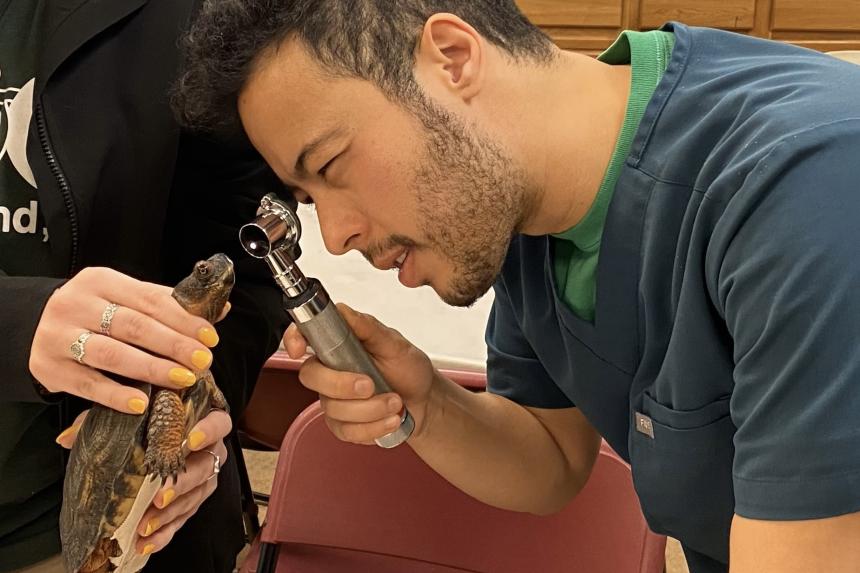In the News
February 06, 2025
In the Kasongoire Forest of western Uganda, nearly 60 chimpanzees build nests and nap in Ficus trees; playful infants jump energetically from hanging vines, while young males sit in circles to groom each other. When you are deep in the forest observing the chimps, it is easy to forget that this forest is only a fraction of its former size....

Video
February 05, 2025
In this eCornell keynote, Drs. Amandine Gamble and Marie Bouilloud share their recent fieldwork experiences in the Antarctic and sub-Antarctic regions to help illustrate how wildlife health is connected to human activity, even thousands of miles away.

January 30, 2025
Smaller fish species are more nutritious, lower in mercury and less susceptible to overfishing, a Cornell-led research team has found.

News
January 27, 2025
Cornell alumnus Julian Rivera, DVM ’18, has found his niche as the Clinical Veterinarian at the Staten Island Zoo. His path from veterinary school to zoo medicine illustrates both the opportunities and challenges faced by aspiring wildlife veterinarians.

Blog
January 25, 2025
Dr. Steve Osofsky, director of the Cornell K. Lisa Yang Center for Wildlife Health, reflects on a transformative year, and looks forward to leading the way in shaping how the center can help tilt the scales back toward the type of environmental stewardship we ourselves need to survive as a species.

Video
January 24, 2025
Professor Steve Osofsky was invited to give the keynote address, “Birthing Planetary Health: A Midwife’s Tale,” at the Sustainable Cornell Summit 2024.

December 17, 2024
A new combination of climate and habitat crises, along with immune system stress, is driving more bat-borne viruses to afflict us. Cornell's Dr. Raina Plowright discusses how any public-health intervention to prevent future pandemics will need to tackle the whole environmental tapestry.

News
December 09, 2024
College of Veterinary Medicine faculty, in partnership with the University of Pretoria in South Africa, have received an NIH P20 grant to establish the Center for Transformative Infectious Disease Research on Climate, Health and Equity in a Changing Environment (C-CHANGE).
News
November 18, 2024
Dr. Eric Baitchman, DVM, DACZM, was drawn to a career in veterinary medicine at an early age. “Growing up, I was really lucky to know veterinarians,” he recalls. “My father worked at the University of Rochester, and he worked alongside Dr. Jeff Wyatt, the main veterinarian for the Seneca Park Zoo in Rochester, New York...

Blog
October 18, 2024
Growing up, I couldn’t wait for the moment evening turned to dusk and the dancing silhouettes of bats began to fill the night sky. This love of bats grew with me, expanding as I could better understand the science behind what made bats so unique....
